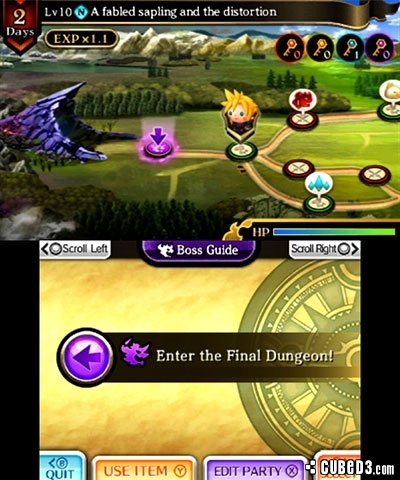Theatrhythm Final Fantasy Curtain Call (Nintendo 3DS) Review
By Az Elias  25.09.2014
25.09.2014

The original Theatrhythm Final Fantasy was a wonderful little title, nostalgically driven towards fans who have journeyed the numerous adventures in the Final Fantasy series to awaken so many fond and emotional memories by tapping along to the revered music. The lack of many songs and overall content was its downfall, however. Does Theatrhythm Final Fantasy Curtain Call now deliver the package that fans have been craving?
It is safe to say Square Enix's rhythmic sequel is leaps and bounds ahead of its predecessor in terms of value for money, with a grand total of 221 songs pulled from the vast majority of games in the Final Fantasy series, including all previous DLC, and over 60 characters to choose from. Straight out of the box, Theatrhythm Final Fantasy Curtain Call addresses the main complaint of the original that there were only a few songs per game, as well as adding length to many tracks that got cut too short. There is still the issue of certain tracks stopping earlier and starting a bit later than they should, but the biggest gripes have definitely been looked at and acted upon.
As with the first title, different coloured notes scroll across the screen from left to right, and must be tapped on correctly with the stylus on the touch screen once they pass over the mark. Red notes require a single tap, green notes need the stylus to be held down until the end of the note, and yellow arrow notes demand a short slide in the direction they are pointing. Landing notes accurately rewards with points, but tapping out of rhythm or missing them entirely will hurt the party's HP, where it is Game Over if it falls to zero.

Three types of stages appear in the game, and are exactly the same as the first Theatrhythm Final Fantasy. Battle Music Sequences (BMS) feature the chosen party of four characters standing on the right side of the screen in classic Final Fantasy battle fashion, and hitting notes correctly will damage enemies on the other side, rewarding with points and items; Field Music Sequences (FMS) have a character strolling over a side-scrolling plain, and hitting notes here will help spur it on to run further and hopefully reach bonus items; and finally, Event Music Sequences (EMS) feature cut-scenes from the represented Final Fantasy title playing in the background, but the mark is the object that moves over the notes this time, making the gameplay a little trickier to adjust to.
Without question, BMSs are the absolute highlight of the package, where the catchiest and most frantic battle melodies from across the series are played. By comparison, FMSs usually feature the more chilled overworld or airship themes, although the higher difficulties ensure they are just as challenging. EMSs are welcome to offer something a little different, but it has to be said that they're just not as fun as BMSs, and it would have been much more preferred to have some of the great tracks used for event sequences in battle sequences instead. The original EMSs from the previous title have been converted into battle and field tunes here, to make room for the added musical content, proving to be a double positive.
One of the greatest new additions comes in the form of the button mode, meaning the stylus doesn't need to be used at all. Button mode works remarkably well, and can quite easily become the preferred method of choice. Red and green notes are hit using any of the A, B, X, Y and shoulder buttons, whilst yellow arrows are activated with a quick slide of the Circle Pad. A hybrid mode of stylus and Circle Pad is even possible, as well as the single-handed method of using just the L button and Circle Pad for the most daring of expert players. If using the stylus was found to be problematic first time around, button mode eradicates those previous issues.

Replacing Dark Notes is Quest Medley - an RPG-like mode where a party of four characters travels across randomly generated 2D overworlds stage by stage, defeating enemies and the boss at the end of a dungeon. This is where the best items and experience points are found, and shards are obtained to unlock further characters. Characters level up and gain better stats, enabling them to defeat more enemies in battle, and obtain more items and EXP. At the same time, abilities can be learned and equipped to characters, adding advantages to help recover HP, deal extra damage and more. With the ability to share completed maps with friends and other users online, Quest Medley becomes the place where most game time will be spent, with a degree of choice in taking different paths to reach the end of the map making it a much better feature than Dark Notes were.
This leads into the online side of things, where one of the most requested options has been successfully implemented. Online versus battles with friends and other random users is one of the standout parts of Curtain Call. All three difficulties can be chosen to play BMSs with people, and a mechanic known as EX Bursts is added to deliver punishment to opponents by filling up the EX Burst bar during battle. These force tricky situations onto the other player, such as swapping the HP of both parties, increasing the speed of the notes, and even hiding notes until the very last second. There is one absolutely awful EX Burst known as Judgement, which takes points off the total score unless each note is landed perfectly ('Critical' appears if successful), and it can destroy a lead even if there is a substantial difference in points. It feels incredibly cheap when an opponent is doing far worse but manages to activate Judgement, and ends up winning because of it. Needless to say, Judgement is often the cause of many rage quitters online. Unfortunately, EX Bursts can only be turned off for Ultimate difficulty, meaning those who want to have a fair one-on-one battle on Basic or Expert are out of luck. It's often preferential to play without EX Bursts because it pits two players against each other fair and square; there can be no excuses by the end for the loser. Not allowing the option for lower difficulties is strange and disappointing, though. Provided Ultimate can be handled, however, some of the most fun of the game easily comes from battling friends in this highest of difficulties.

For all of the improvements in terms of content and game modes, there are sadly some nitpicks that should be pointed out. Nitpicking really is what this is, because it is difficult to complain about a rhythm game that has 221 songs in it - the vast majority of which are excellent choices. However, even though just about everybody will be able to moan about why Song A was included over Song B, some of the selections do raise eyebrows. There are still some unforgettable tracks in the series that have been overlooked here, such as FFVII's Birth of a God, FFVIII's The Landing, and FFIX's Vamo Alla Flamenco. The FFXIII games have their fair share of missing quality pieces, including Death Game from Lightning Returns, and it's too much of a shame that Savior of Souls is wasted as an EMS. Some titles have been left out entirely. The likes of Final Fantasy Tactics Advance, Dirge of Cerberus: FFVII, various Crystal Chronicles titles and many other spin-offs aren't represented at all. This is taking into consideration the confirmed DLC that has already released in Japan (where some optional songs and characters have been questionable), and has currently come to a mysterious halt. Square Enix has said it is possible to keep new songs coming, so there is hope for so many more tracks and games to get a look in, but time will tell.
Equally disappointing is that vocal songs Melodies of Life (FFIX), 1000 Words (FFX-2) and Sound of the Wind (FF Crystal Chronicles) are the Japanese versions, meaning the sort of emotional ties associated to such tracks are slightly lost whilst playing them. Pressing a little further, those accursed rotating arrows return on occasion in Quest Medley, there are no audible previews for DLC songs, and menus can be rather unintuitive and slow (especially when equipping abilities).
These minor complaints are exactly that, though, and don't tarnish what is a match made in heaven for Final Fantasy fans.

Cubed3 Rating
Exceptional - Gold Award

Over 25 years of history is crammed into Theatrhythm Final Fantasy Curtain Call, and it is a marked improvement over the first game. Owners of the original won't find too much different, but online versus mode in itself, plus the substantial increase in the number of songs and characters is enough to dip on this sequel. Bursting at the seams with nostalgia, Curtain Call is a game no one Final Fantasy fan can afford to pass on.

![]() 9/10
9/10
![]() 9/10
(3 Votes)
9/10
(3 Votes)
 Out now
Out now  Out now
Out now  Out now
Out now  Out now Also on
Out now Also on 
Comments
Comments are currently disabled

 Sign In
Sign In Game Details
Game Details Subscribe to this topic
Subscribe to this topic Features
Features






 Top
Top

